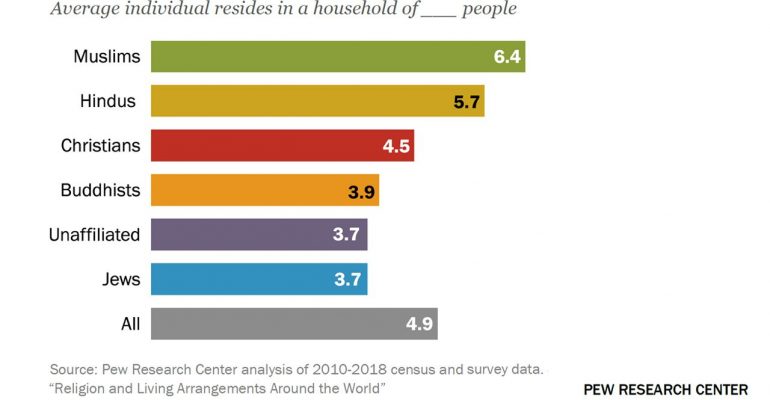Religion and Living Arrangements Around the World
December 12, 2019 2023-07-01 13:40Religion and Living Arrangements Around the World

Religion and Living Arrangements Around the World
Muslims and Hindus have larger households than Christians and religious ‘nones,’ in patterns influenced by regional norms.
Our households – who lives with us, how we are related to them and what role we play in that shared space – have a profound effect on our daily experience of the world. A new Pew Research Center analysis of data from 130 countries and territories reveals that the size and composition of households often vary by religious affiliation.
Worldwide, Muslims live in the biggest households, with the average Muslim individual residing in a home of 6.4 people, followed by Hindus at 5.7. Christians fall in the middle (4.5), forming relatively large families in sub-Saharan Africa and smaller ones in Europe. Buddhists (3.9), Jews (3.7) and the religiously unaffiliated (3.7) – defined as those who do not identify with an organized religion, also known as “nones” – live in smaller households, on average.
Why study households from an individual’s point of view?
Household size is one easy way to compare the lived experiences of people around the world. Bigger households are common in less-developed countries, where people tend to have more children and families share limited resources. Smaller households are prevalent in wealthier countries, which tend to have aging populations and lower birth rates.
But the number of people in any given household is only one dimension of living arrangements. Since households of the same size can be so qualitatively different from each other – a three-person household might consist of a couple and one child, a child with a parent and grandparent, a husband and two wives, or numerous other combinations – understanding the distribution of various types of households also is valuable.
Globally, the most common household type is the extended family, accounting for 38% of the world’s population. But some religious groups are more likely to live in extended families than others. Hindus are the only major group in which a majority lives with extended family, such as grandparents, uncles and in-laws. Muslims, Christians and Jews are more likely to reside in two-parent households, composed of two partners with one or more minor children. Living alone is unusual among all religious groups, but it is more common among Jews than among the world’s other major religions: About one-in-ten Jews worldwide are in solo households. From a global perspective, Jews also are much more likely than non-Jews to live in households consisting of a couple without children or other relatives.
Source: Pew Research Center








